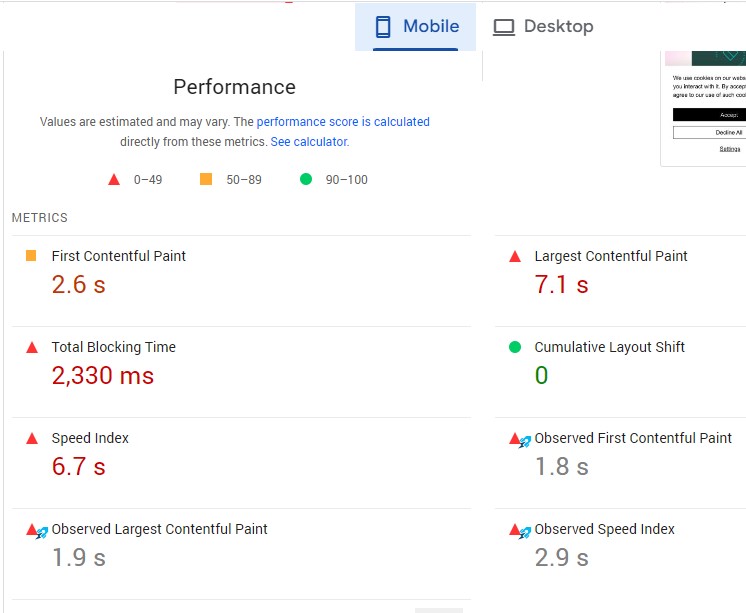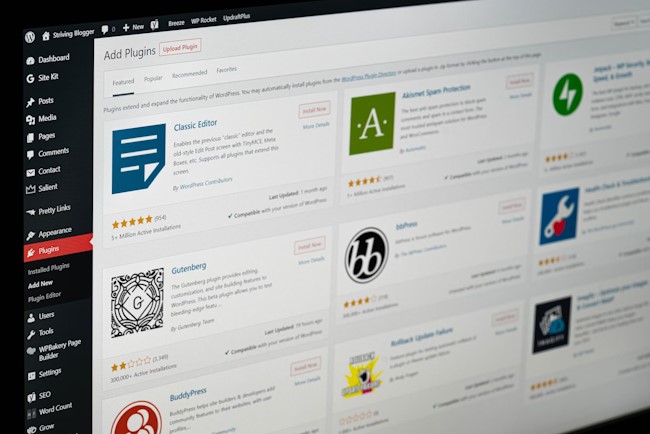Google Core Vitals
Pros
- Automated Optimization: Some WYSIWYG builders offer automated features to improve Core Vitals, such as image optimization and lazy loading.
- Monitoring Tools: Integrated tools can help monitor Core Vitals metrics, alerting users to issues that need attention.
- Responsive Design: Ensuring mobile-friendliness inherently benefits metrics like Largest Contentful Paint (LCP) and First Input Delay (FID).
Cons
- Page Speed: The excessive code generated by these builders can slow down the website, negatively affecting LCP and Cumulative Layout Shift (CLS).
- Inconsistent Performance: Automated optimizations might not be as effective as manual tweaks, leading to variable performance across different pages and devices.
- Limited Control: Users have less control over the fine-tuning required to meet Google’s Core Vitals thresholds, which can impact overall site performance and rankings.
Security
One area of concern with automated website builders is security.
- Database Generated: Most website builders use a backend app such as PHP (a scripting langauge that produces pages on the fly and stores the information in a database).
- Security Updates: These types of scripts require updates to patch coding vulnerabilities on a regular basis to protect the website from hacking attacks.
- Database Backups: Since these scripts store your site data in a database, the site owner must back up the database often.
- Data Storage: The way data is stored and handled by automated builders can be opaque, raising concerns about compliance with privacy regulations like GDPR or CCPA.
- Multi-Tenancy: Automated builders often host multiple websites on the same infrastructure, increasing the risk that a breach in one site could impact others.
- Ease of Use vs. Security: While ease of use is a key selling point, it can also lead to user errors and misconfigurations that compromise security.
- SEO Manipulation: Automated builders might be more susceptible to SEO manipulation techniques used by attackers to spread malware or phishing schemes. Sometimes SEO agencies use "black hat" techniques that can result in a website being removed from Googe's SERPs (Search Engine Results Pages)
While automated online website builders offer numerous benefits, it's important for users to be aware of potential security pitfalls and take proactive steps to mitigate them where possible.
Conclusion
Online website builders offer a convenient and accessible way for individuals to create websites without in-depth technical knowledge. They excel in ease of use, speed of development, and consistent design. However, they fall short in areas critical for long-term success, such as code quality, SEO, security and Google Core Vitals.
Clean code is one very important reason to avoid automated website builders. A service like CMS Amigo can be used to edit just about any type of webpage, but pure code webpages provide so many distinct advantages. Such as ease of performing SEO, backing up and transferring your site, the ability to add critical plug-ins, speed and passing Googele's Core Vitals Test.
No matter what your decision with regards to the deployment and editing of your website, we wish you the very best in your adventure.
Below is the graph of the Google Site Speed test we conducted on the website mentioned at the top of this page. The numbers in red indicate failures of those core vitals. The score was below 35 and a good and acceptable score should be 90+. Needless to say we could not get a Google search result in the first 100 sites listed. This is just one example of how a poor score using Google Site Core test can affect a website. If you happen to have the name recognition of major Internet sites then you might just not need to optimize your site's performance, otherwise you should do all you can to have a site that passes all critical performance tests.



